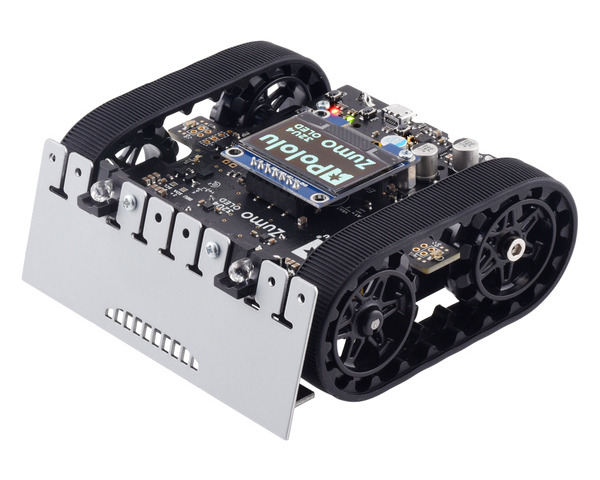

This is a merged information page for Item #4991.
View normal product page.
Pololu item #:
4991
Brand:
Pololu
Status:
Active and Preferred

The Pololu Zumo 32U4 OLED robot is a versatile tracked robot based on the Arduino-compatible ATmega32U4 MCU. It includes two 50:1 HP micro metal gearmotors along with integrated dual motor drivers, a graphical OLED display, quadrature encoders, line sensors, side and front proximity sensors for detecting objects, and a full IMU for detecting impacts and tracking orientation. The low-profile robot is less than 10 cm × 10 cm—small enough to qualify for Mini Sumo. No soldering or assembly is required; just add 4 AA batteries and a USB A to Micro-B cable and your Zumo is ready for programming.
Alternatives available with variations in these parameter(s): version Select variant…
 Compare all products in Zumo 32U4 OLED Robot or
Compare all products in Zumo 32U4 OLED Robot or  Robot Kits without Soldering.
Robot Kits without Soldering.
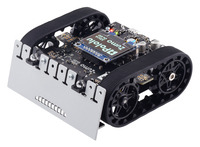 |
Assembled Zumo 32U4 OLED robot. |
|---|
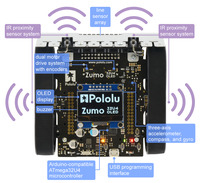 |
Main features of the Zumo 32U4 OLED robot. |
|---|
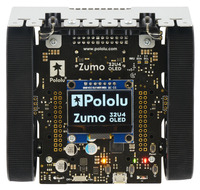 |
Assembled Zumo 32U4 OLED robot, top view. |
|---|
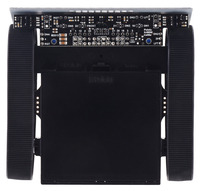 |
Assembled Zumo 32U4 OLED robot, bottom view. |
|---|
 |
Assembled Zumo 32U4 OLED robot, front view. |
|---|
 |
Assembled Zumo 32U4 OLED robot, side view. |
|---|
 |
Assembled Zumo 32U4 OLED robot, back view. |
|---|
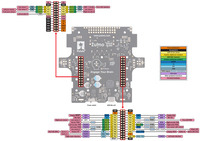 |
Zumo 32U4 OLED top expansion pinout. |
|---|
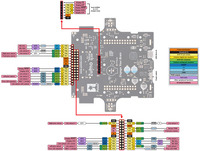 |
Zumo 32U4 OLED front expansion and display connector pinout. |
|---|
The Zumo 32U4 OLED is a highly integrated, user-programmable and customizable tracked robot. It measures less than 10 cm on each side and weighs approximately 275 g with batteries (160 g without), so it is both small enough and light enough to qualify for Mini-Sumo competitions, but its versatility makes it capable of much more than just robot sumo battles.
At the heart of the Zumo 32U4 is an ATmega32U4 AVR microcontroller from Microchip (formerly Atmel), and like our A-Star 32U4 programmable controllers, the Zumo 32U4 features a USB interface and ships preloaded with an Arduino-compatible bootloader. A software add-on is available that makes it easy to program the robot from the Arduino environment, and we have Arduino libraries and example sketches to help get you started. A USB A to Micro-B cable (not included) is required for programming. For advanced users who want to customize or enhance their robots with additional peripherals, the robot’s power rails and microcontroller’s I/O lines can be accessed via 0.1″-spaced through-holes along the sides and front of the main board.
|
|
|
The Zumo 32U4 features two H-bridge motor drivers and a variety of integrated sensors, including a pair of quadrature encoders for closed-loop motor control, a complete inertial measurement unit (3-axis accelerometer, gyro, and magnetometer), five downward-facing reflectance sensors for line-following or edge-detection, and front- and side-facing proximity sensors for obstacle detection and ranging. Three on-board pushbuttons offer a convenient interface for user input, and a 128×64 graphical OLED display, buzzer, and indicator LEDs allow the robot to provide feedback.
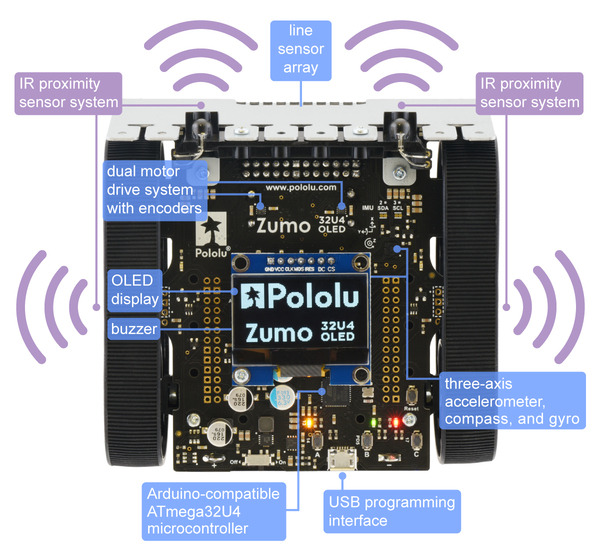 |
The Zumo 32U4 OLED robot is available fully assembled with three different motor options (see the Motors section below for more information on how these different gear ratios perform):
The Zumo 32U4 OLED robot is also available as a kit (without motors) for those who would prefer to assemble it themselves or who want to use different motors than those in the three assembled versions.
March 2024 update: We are transitioning the OLED displays from units with blue PCBs to functionally identical versions with black PCBs. Some of the pictures and videos on our website still show the original blue displays.
This version of the Zumo 32U4 OLED robot (item #4991) ships fully assembled with a pair of 50:1 HP micro metal gearmotors (with extended motor shafts). As described above, two assembled versions are also available with higher gear ratios (so they are both slower but able to deliver more torque).
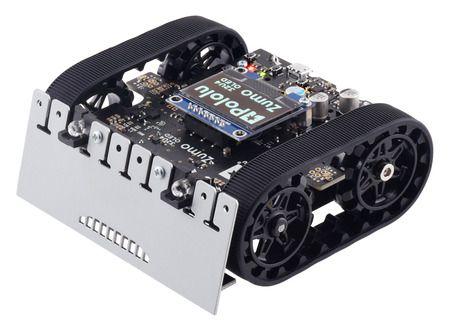 |
Assembled Zumo 32U4 OLED robot. |
|---|
This is a newer Zumo 32U4 OLED Robot with a graphical OLED display. For its original version counterpart with an LCD, see the Zumo 32U4 Robot (Assembled with 50:1 HP Motors).
You can use the following table to compare these three gear ratios in more detail. The first four columns are specifications of the motors themselves, while the last column is the measured top speed of a Zumo chassis loaded to a weight of 500 g and driven with these motors. Note that the specifications are for 6V operation, which is approximately the voltage you would get with four alkaline batteries; four NiMH AA cells will typically provide less than 5V.
| Micro Metal Gearmotor |
Free-Run Speed @ 6V |
Stall Torque @ 6V |
Stall Current @ 6V |
Top Zumo Speed @ 6V and 500g |
|
|---|---|---|---|---|---|
| 50:1 HP or 50:1 HPCB | 625 RPM | 15 oz·in | 1600 mA | 40 in/s | (100 cm/s) |
| 75:1 HP or 75:1 HPCB | 400 RPM | 22 oz·in | 1600 mA | 25 in/s | (65 cm/s) |
| 100:1 HP or 100:1 HPCB | 320 RPM | 30 oz·in | 1600 mA | 20 in/s | (50 cm/s) |
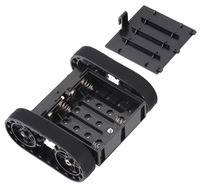 |
The Zumo 32U4 robot runs off of four AA batteries. It works with both alkaline and NiMH batteries, though we recommend using rechargeable AA NiMH cells.
|
|
|
Our older Zumo robot for Arduino, built with a Zumo Shield, is another Arduino-compatible robotic platform based on the Zumo chassis. The Zumo Shield mounts to the Zumo chassis and features motor drivers and various sensors, but it does not have an integrated microcontroller; rather, it is designed to interface with boards that have a standard Arduino form factor, like an Arduino Uno, Arduino Leonardo, or A-Star 32U4 Prime, and these boards serve as the main controller for the robot.
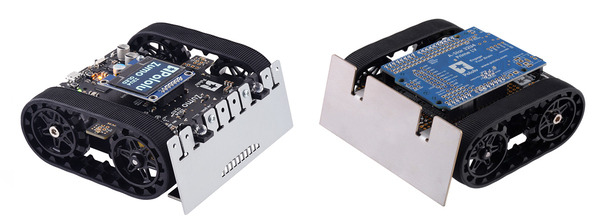 |
A Zumo 32U4 OLED robot (left) and a Zumo robot for Arduino with an A-Star 32U4 Prime LV (right). |
|---|
By contrast, the Zumo 32U4 OLED includes an on-board ATmega32U4 microcontroller (the same one used in the Leonardo and A-Star 32U4 boards), combining the functions of the Zumo Shield and the separate Arduino controller into a single, compact board that is just as easy to program as a standard Arduino or A-Star thanks to its USB interface and preloaded Arduino-compatible bootloader. The Zumo 32U4 retains all the features of the Zumo shield (e.g. dual motor drivers, inertial sensors, and buzzer) while adding many new features, including dual quadrature encoders, proximity sensors, a graphical OLED display, and two extra user pushbuttons.
Some of the pin mappings and software libraries differ between the Zumo 32U4 and Zumo robot for Arduino, so programs written for one robot generally need to be modified to work on the other.
| Size: | 96L × 99W × 39H mm |
|---|---|
| Weight: | 160 g1 |
| Processor: | ATmega32U4 @ 16 MHz |
|---|---|
| RAM size: | 2560 bytes |
| Program memory size: | 32 Kbytes2 |
| External programmer required?: | N |
| Assembled: | Y |
| Version: | assembled with 50:1 HP motors |
| PCB dev codes: | zum02d |
|---|---|
| Other PCB markings: | 0J13542 |
User’s manual for the Pololu Zumo 32U4 robot.
This download contains the Windows drivers for the A-Star 32U4 and the rest of our 32U4 family of boards.
This model uses simplified models of the control electronics to reduce the file size. More detailed models are available separately of the Zumo 32U4 OLED main board (24MB step) and Zumo 32U4 front sensor array (4MB step).
This DXF drawing shows the locations of all of the board’s holes.
Datasheet for the sensor used on the QTR-3RC and QTR-3A Reflectance Sensor Arrays, the Zumo 32U4 robot front sensor array, and the Optical Encoders for micro metal gearmotors.
The Zumo32U4 library for the Arduino IDE helps interface with the on-board hardware on the Zumo 32U4 robot.
This repository contains Arduino add-on files, Windows drivers, and bootloaders for the A-Star 328PB, A-Star 32U4, and the rest of our 32U4 family of boards.
Microchip’s product page for the ATmega32U4 AVR microcontroller, with links to its datasheet, application notes, and other resources.
No FAQs available.
Our 3pi+ 32U4 robot got an upgraded OLED display earlier this year, and now it’s the Zumo’s turn with the release of our new Zumo 32U4 OLED Robot!...